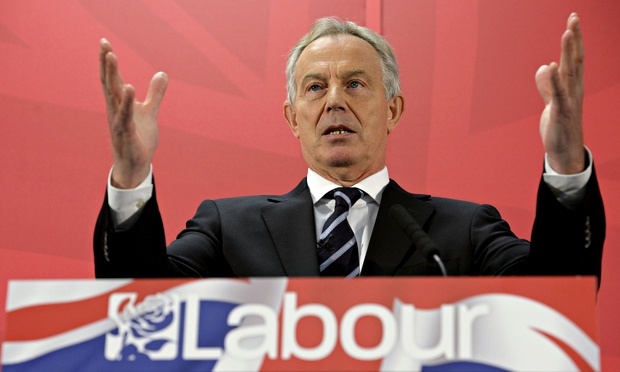Tony Blair has insisted that Labour can recover from its disastrous general election defeat only if it reoccupies the centre ground of British politics, proudly championing a pro-business agenda and bold new ideas to reform public services.
As the party attempts to come to terms with a devastating result that saw the Conservatives returned to office for five more years with an unexpected Commons majority, the former prime minister and three-times election winner said Labour has to be “for ambition and aspiration as well as compassion and care”.
While generous about Ed Miliband – praising him for showing “courage under savage attack” and campaigning brilliantly – Blair made clear in an article in the Observer that he believes Miliband’s left-of-centre agenda alienated the business community and failed to appeal to those wanting to get on in life. In an unashamed call for the party to return to the approach of New Labour which Miliband abandoned, Blair wrote: “The route to the summit lies through the centre ground.
“The Labour party has to be for ambition as well as compassion and care. Hard-working families don’t just want us celebrating their hard work; they want to know that by hard work and effort they can rise up, achieve. They want to be better off and they need to know we don’t just tolerate that, we support it.”
His intervention sets the stage for weeks of bitter arguments over the direction the party should take as it seeks a new leader who can take the party into a 2020 election and ensure it does not spend three terms out of office.
Seeking to avoid any impression that he is stoking conflict at a low point in the party’s history, Blair made the striking admission that Miliband was right to champion the cause of inequality and accepted that during his two-and-a-half terms as prime minister he paid the issue insufficient attention.
“Ed was absolutely right to raise the issue of inequality and to say that Labour should focus anew on it. This will stand as his contribution to the party’s development. In so far as this was an implied rebuke to my politics, I accept it. But we still need ways relevant to today and tomorrow, not yesterday, to tackle it.”
He said that Labour could be convincing in advancing the case for greater equality only if it does so within a wider pro-business agenda. “We have to conduct the big argument on the wealth-creating potential of the macro-economy, not only the targeted campaign on the injustices of it. So we were proud in 1997 to put forward the case for Britain’s first minimum wage. But we could never have an election on it unless set within a broader framework. The same is true with zero-hours contracts.”








